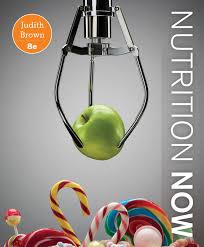Description
Test Bank For Nutrition Now 8th Edition By Judith E. Brown
Unit 04 – Understanding Food and Nutrition Labels
|
True / False |
|
1. Cookies sold at a local bakery must display a Nutrition Facts panel on the package. a. True b. False ANSWER: False REFERENCES: Nutrition Labeling LEARNING OBJECTIVES: NNOW.BRWN.17.4.1 – Explain the details of the four major areas covered by the nutrition labeling regulations. KEYWORDS: Bloom’s: Remember |
|
2. The “radura” symbol on a food package indicates that the food has been irradiated using X-rays, gamma rays, or electron beams. a. True b. False ANSWER: True REFERENCES: Nutrition Labeling LEARNING OBJECTIVES: NNOW.BRWN.17.4.1 – Explain the details of the four major areas covered by the nutrition labeling regulations. KEYWORDS: Bloom’s: Remember |
|
3. The amount of vitamins and minerals added due to the fortification of foods must be listed in the Nutrition Facts panel. a. True b. False ANSWER: True REFERENCES: Nutrition Labeling LEARNING OBJECTIVES: NNOW.BRWN.17.4.1 – Explain the details of the four major areas covered by the nutrition labeling regulations. KEYWORDS: Bloom’s: Remember |
|
4. Ingredients listed on the ingredient label are listed in descending order according to the number of calories each ingredient contributes. a. True b. False ANSWER: False REFERENCES: Nutrition Labeling LEARNING OBJECTIVES: NNOW.BRWN.17.4.1 – Explain the details of the four major areas covered by the nutrition labeling regulations. KEYWORDS: Bloom’s: Remember |
|
5. ndustry-initiated labeling systems are voluntary and generally employ science-based criteria for judging the nutrient qualities of food products. a. True b. False ANSWER: True REFERENCES: Other Nutrition Labeling Systems LEARNING OBJECTIVES: NNOW.BRWN.17.4.4 – Summarize the strengths and weaknesses of nutrition labeling systems on food packaging and calorie listings for food items. KEYWORDS: Bloom’s: Remember |
|
6. The term organic is not regulated by the USDA or any other government agency for use on food packages. a. True b. False ANSWER: False REFERENCES: Organic Foods LEARNING OBJECTIVES: NNOW.BRWN.17.4.3 – Compare the characteristics of organically and conventionally produced food products. KEYWORDS: Bloom’s: Remember |
|
7. Foods that are labeled organic cannot be grown from genetically modified seeds or treated by irradiation. a. True b. False ANSWER: True REFERENCES: Organic Foods LEARNING OBJECTIVES: NNOW.BRWN.17.4.3 – Compare the characteristics of organically and conventionally produced food products. KEYWORDS: Bloom’s: Remember |
|
8. Model health claims approved by the FDA cannot be modified or abbreviated when placed on food labels. a. True b. False ANSWER: False REFERENCES: Nutrition Labeling LEARNING OBJECTIVES: NNOW.BRWN.17.4.1 – Explain the details of the four major areas covered by the nutrition labeling regulations. KEYWORDS: Bloom’s: Remember |
|
9. Dietary supplements have to undergo rigorous testing and obtain FDA approval before they are sold. a. True b. False ANSWER: False REFERENCES: Dietary Supplement Labeling LEARNING OBJECTIVES: NNOW.BRWN.17.4.2 – Comment on nutrient content and health claims made on dietary supplement labels. KEYWORDS: Bloom’s: Remember |
|
10. The most common food additives are potassium and salt. a. True b. False ANSWER: False REFERENCES: Nutrition Labeling LEARNING OBJECTIVES: NNOW.BRWN.17.4.1 – Explain the details of the four major areas covered by the nutrition labeling regulations. KEYWORDS: Bloom’s: Remember |
|
11. The USDA requires retailers to display a country-of-origin label on meats, fish, fruits, vegetables, many nuts, and some herbs. a. True b. False ANSWER: True REFERENCES: Dietary Supplement Labeling LEARNING OBJECTIVES: NNOW.BRWN.17.4.2 – Comment on nutrient content and health claims made on dietary supplement labels. KEYWORDS: Bloom’s: Remember |
|
12. Meat products labeled “lean” must contain fewer than 5 grams of fat and no trans fat. a. True b. False ANSWER: False REFERENCES: Nutrition Labeling LEARNING OBJECTIVES: NNOW.BRWN.17.4.1 – Explain the details of the four major areas covered by the nutrition labeling regulations. KEYWORDS: Bloom’s: Remember |
|
13. The FDA determined that the labeling of GMO foods is warranted and GMO foods need to be labeled in the United States. a. True b. False ANSWER: False REFERENCES: Nutrition Labeling LEARNING OBJECTIVES: NNOW.BRWN.17.4.1 – Explain the details of the four major areas covered by the nutrition labeling regulations. KEYWORDS: Bloom’s: Remember |
|
14. “Unintentional additives” do not have to be included on the ingredient label. a. True b. False ANSWER: True REFERENCES: Nutrition Labeling LEARNING OBJECTIVES: NNOW.BRWN.17.4.1 – Explain the details of the four major areas covered by the nutrition labeling regulations. KEYWORDS: Bloom’s: Remember |
|
15. Organic foods have been shown to be superior overall in nutrient content and effects on health. a. True b. False ANSWER: False REFERENCES: Organic Foods LEARNING OBJECTIVES: NNOW.BRWN.17.4.3 – Compare the characteristics of organically and conventionally produced food products. KEYWORDS: Bloom’s: Remember |
|
16. The term natural is defined by the FDA and means that the food contains no artificial ingredients. a. True b. False ANSWER: False REFERENCES: Nutrition Labeling LEARNING OBJECTIVES: NNOW.BRWN.17.4.1 – Explain the details of the four major areas covered by the nutrition labeling regulations. KEYWORDS: Bloom’s: Remember |





Be the first to review “Test Bank For Nutrition Now 8th Edition By Judith E. Brown”